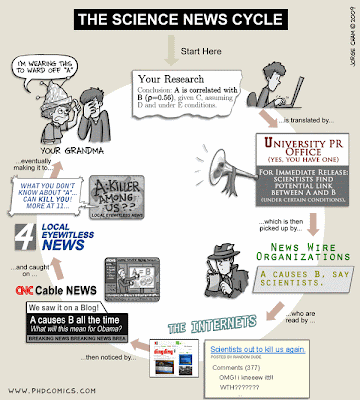Wonks and the Press
June 21, 2010
Tags:
Communication
Politics
Science
The academy and the press can have somewhat of a love/hate relationship (ok, maybe mostly hate). Academics don't want to give soundbites and journalists want a juicy story. Abstract theories just don't mesh well with a nitty-gritty 24-hour news cycle. But in the realm of politics, the relationship may be warming a bit. This recent article in the Columbia Journalism Review traces the growing influence and acceptance of political science research in political reporting and commentary. Some quotes:
In November 2007, The Monkey Cage–the name comes from an H. L. Mencken line about the nature of democracy–was launched...perhaps The Monkey Cage's greatest influence has been in fostering a nascent poli-sci blogosphere, and in making the field's insights accessible to a small but influential set of journalists and other commentators who have the inclination–and the opportunity–to approach politics from a different perspective. That perspective differs from the standard journalistic point of view in emphasizing structural, rather than personality-based, explanations for political outcomes.
These powerful, simple explanations are often married to an almost monastic skepticism of narratives that can't be substantiated, or that are based in data–like voter's accounts of their own thinking about politics–that are unreliable. Think about that for a moment, and the challenge to journalists becomes obvious: If much of what's important about politics is either stable and predictable or unknowable, what's the value of the sort of news–a hyperactive chronicle of the day's events, coupled with instant speculation about their meaning–that has become a staple of modern political reporting?
The journalists who have engaged most with political science...have something in common: they're operating under a new model of what it means to be a political reporter, one that allows them to conceive of "news" in a different way.
That's not to say that traditional reporting tasks will go by the wayside, nor should they. But even in day-to-day coverage, a poli-sci perspective can have value in helping reporters make choices about which storylines, and which nuggets of information, really matter. For that to happen, political scientists must do more to make their work accessible, reaching beyond the circle of journalists who are inclined to, as Sides says, "embrace the wonk."
Because of course, not everyone is running to embrace the wonk. Here's a (hilarious) response from a journalist at Slate: What if Political Scientists Covered the News?
Related Link (and comic above): Not political science, but my favorite comic on press coverage out there!
Added 6/23: Bloggingheads discussion between Jay Rosen & Julian Sanchez on the ideology of the press and related topics (they address political journalism in the first section).
